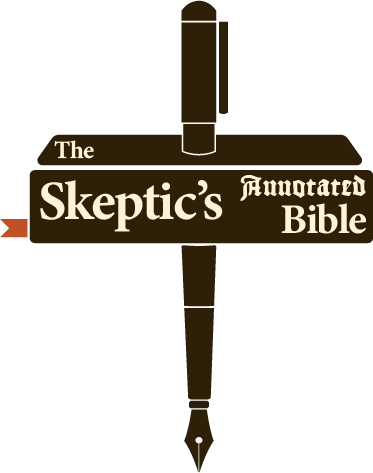A wicked and adulterous generation (asks for a sign)
1
The Pharisees also with the Sadducees came, and tempting desired him that
he would shew them a sign from heaven.
2
He answered and said unto them, When it is evening, ye say, It will be
fair weather: for the sky is red.
3And in the morning, It will be foul weather to day: for the sky is red and
lowering. O ye hypocrites, ye can discern the face of the sky; but can ye not
discern the signs of the times?
The Pharisees and Sadducees asked Jesus to show them a sign from heaven.
Jesus said to them,
In the evening you say, "It will be fair weather for the sky is red."
And in the morning you say, "It will be foul weather today, for the sky is red and lowering." [1]
You hypocrites [2], you can read the sky, but not the signs of the times.
4A wicked and adulterous generation seeketh after a
sign; and there shall no sign be given unto it, but the sign of the
prophet Jonah. And he left them, and departed.
A wicked and adulterous generation asks for a sign.
There will be no sign given to it, except for the sign of Jonah. [3]
And he left and departed.
The yeast of the Pharisees and Sadducees
5
And when his disciples were come to the other side, they had forgotten to
take bread.
When Jesus and his disciples came to the other side, they forgot to bring bread.
6
Then Jesus said unto them, Take heed and beware of the leaven of the
Pharisees and of the Sadducees.
Jesus said them,
Beware of the yeast of the Pharisees and Sadducees.
7
And they reasoned among themselves, saying, It is because we have taken no
bread.
The disciples said to one another,
He is angry with us for not bringing bread.
8
Which when Jesus perceived, he said unto them, O ye of little faith, why
reason ye among yourselves, because ye have brought no bread?
Jesus was aware of their comments, and said,
Oh you of little faith, why do you talk about having no bread.
9Do ye not yet understand, neither remember the five loaves of the five
thousand, and how many baskets ye took up?
Do you still not understand?
Don't you remember the five loaves that fed five thousand [4], and the baskets that were left over?
10Neither the seven loaves of the four thousand, and how many baskets ye
took up?
Or the seven loaves that fed four thousand [5], and the baskets that were left over?
11
How is it that ye do not understand that I spake it not to you concerning
bread, that ye should beware of the leaven of the Pharisees and of the
Sadducees?
Why didn't you understand that I wasn't talking about bread, but that you should beware of the yeast of the
Pharisees and Sadducees?
12Then understood they how that he bade them not beware of the leaven of
bread, but of the doctrine of the Pharisees and of the Sadducees.
Then the disciples understood that Jesus wasn't talking about the yeast in bread, but the yeast in the
doctrine of the Pharisees and Sadducees. [
6]
Peter declares Jesus to be Christ
(and becomes the first pope)
13
When Jesus came
into the coasts of Caesarea Philippi, he asked his disciples, saying, Whom do men say that I
the Son of man am?
When Jesus came to Caesarea Philippi, he asked his disciples,
Who do people say I am?
14And they said, Some say that thou art John the Baptist: some, Elijah; and others,
Jeremiah, or one of the prophets.
They said,
Some say you're John the Baptist, some say you're Elijah, others say your Jeremiah or one of the prophets.
[7]
15
He saith unto them, But whom say ye that I am?
Jesus said,
But whom do you say that I am?
16
And Simon Peter answered and said, Thou art the Christ, the Son of the
living God.
Peter said,
You are the Christ, the Son of the living God.
17And Jesus answered and said unto him, Blessed art thou, Simon Barjona: for
flesh and blood hath not revealed it unto thee, but my Father which is in
heaven.
Jesus said,
Blessed are you, Simon son of Jonah, because no human has revealed this to you, but my Father in heaven.
[8]
18
And I say also unto thee, That thou art Peter, and upon this rock I will
build my church; and the gates of hell shall not prevail against it.
You are Peter, and upon this rock I will build my church. And the gates of hell will not prevail against it.
[9]
19And I will give unto thee the keys of the kingdom of heaven: and
whatsoever thou shalt bind on earth shall be bound in heaven: and whatsoever
thou shalt loose on earth shall be loosed in heaven.
I give you the keys to the kingdom of heaven. Whatever you forbid on earth shall be fobidden in heaven,
and whatever you allow on earth will be allowed in heaven.
20Then charged he his disciples that they should tell no man that he was
Jesus the Christ.
Then Jesus told his disciples not to tell anyone that he was the Christ. [
10]
Jesus foretells his death and resurrection
(and calls Peter "Satan")
21From that time forth began Jesus to shew unto his disciples, how that he
must go unto Jerusalem, and suffer many things of the elders and chief
priests and scribes, and be killed, and be raised again the third day.
From this time on, Jesus began to explain to his disciples how he must go to Jerusalem; suffer many things from
the elders, priests, and scribes; be killed; and raised again on the third day. [
11]
22
Then Peter took him, and began to rebuke him, saying, Be it far from thee,
Lord: this shall not be unto thee.
Then Peter took him aside and said,
Lord, this will not happen to you!
23
But he turned, and
said unto Peter, Get thee behind me, Satan: thou art an offence unto me:
for thou savourest not the things that be of God, but those that be of men.
Jesus turned and said to Peter,
Get away from me, Satan! [12]
You offend me, because you value the things of men, not of God.
24
Then said Jesus unto his disciples, If any man will come after me, let him
deny himself, and take up his cross, and follow me.
Then Jesus said to his disciples,
If anyone wants to be my disciple, let him deny himself, carry his cross, and follow me.
25
For whosoever will save his life shall lose it: and whosoever will lose
his life for my sake shall find it.
Whoever saves his life will lose it; and whoever loses his life for my sake will find it. [13]
26
For what is a man profited, if he shall gain the whole world, and lose his
own soul? or what shall a man give in exchange for his soul?
What does it profit a man to gain the whole world and lose his soul?
How much is your soul worth, anyway?
Jesus will come again soon
(within the lifetime of some of his listeners)
27
For the Son of man shall come in the glory of his Father with his angels;
and then he shall reward
every man according to his works.
The Son of man will come in the glory of the Father with his angels, and he will reward every man
according to his works. [14]
28
Verily I say unto you, There
be some standing here, which shall not taste of death, till they see the Son
of man coming in his kingdom.
There are some standing here that will still be alive when they see the Son of Man coming in his kingdom.
[15]






 16:1-4, Cf.
16:1-4, Cf.  16:13-20,
Cf.
16:13-20,
Cf.  16:21-26,
16:21-26, 
 Every Jot and Tittle: All the commandments in the Bible
Every Jot and Tittle: All the commandments in the Bible
Matthew 16:18 - This verse is said to be the connection between the birth of Christianity and its inspiration, Mithranism.
The name "Peter" is 12th century Old English, stemming from Latin, and Greek. It translates to "stone" or "rock." This is interesting considering in 6th century B.C. Persia, Mithra was "The Way... Light... Word... Son of God..." etc. Mithranism born of the belief in Mithra showed a lot of the same core features of what Jesus would carry centuries later.
Born of a virgin, connections to Sunday being sacred or "The Lord's Day", December 25th being a day of celebration, and the overarching idea that there's going to be a "Day of Judgment" (or commonly referred to today in Christianity as "The Rapture".)
However, the biggest connection (theft?) between Mithra and Jesus is the death and three-day resurrection. Mithra also went through this ordeal. Mithranites (?) were eventually eradicated by Roman Christians altogether. I wonder why...
Petra, the historical site in Jordan, is what is understood to be the inspiration for the Apostle Peter in the Biblical account, hence the verse in Matthew. It was a place for worship of Arab gods, but the place was assaulted by a rather large army and converted into a Christian landmark. Romans at it again.